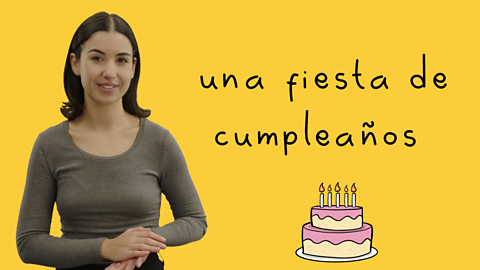
Greetings
It is polite to greet people when you see them for the first time that day, using these phrases:
- ВЎHola, buenos dГӯas! - Hello, good morning!
or
- Buenas tardes, ВҝcГіmo estГЎs? - Good afternoon, how are you?
When you want to say 'goodbye' to someone, you can say:
- ВЎҙЎ»еҫұГіІх! - Goodbye!
or
- Buenas noches, hasta maГұana - Good night, see you tomorrow.

In English, we normally use вҖҳgood afternoonвҖҷ after midday, but in Spanish you would not start to use buenas tardes until after lunch, which is typically any time after 13:00.
You use buenas noches as вҖҳgood eveningвҖҷ when it is dark.
You can also use buenas noches as вҖҳgood nightвҖҷ when you go to sleep.
Here are some words you can use. Can you create a dialogue to greet someone?
| Spanish | English |
|---|---|
| hola | hello |
| І№»еҫұГіІх | goodbye |
| buenos dГӯas | good morning |
| buenas tardes | good afternoon |
| buenas noches | good evening/good night |
| hasta luego | see you later |
| hasta maГұana | see you tomorrow |
Asking how someone is
To ask someone how they are, you can say either of the following:
- Вҝ°дГііҫҙЗ estГЎs? - How are you?
or
- ВҝQuГ© tal? - How are you?
ВҝQuГ© tal?
How are you?
And reply by saying estoy (I am) followed by an adjective to describe how you are feeling.
For example:
- Estoy bien, gracias. ВҝY tГә? - I am well, thank you, and you?

Adjectives are words used to describe people, places or things.
Here are some useful words and phrases to talk about how you are feeling.
| Spanish | English |
|---|---|
| Вҝ°дГііҫҙЗ estГЎs?/ВҝQuГ© tal? | How are you? |
| Estoy bien | I am well |
| Estoy muy bien | I am very well |
| Estoy mal | I am not good/I am bad |
| Estoy muy mal | I am very bad |
| Estoy asГӯ asГӯ/regular | I am so-so |
| ВҝY tГә? | And you? |

Saying your name
You can ask someone their name by saying:
- Вҝ°дГііҫҙЗ te llamas? - What is your name?
And reply with:
- Me llamoвҖҰ - I am calledвҖҰ
Listen to this conversation.
Can you adapt it to talk about yourself?
Check your understanding by looking in the Audio Transcript box.
Ana - Вҝ°дГііҫҙЗ te llamas? (What is your name?)
Hamza - Me llamo Hamza. ВҝY tГә? Вҝ°дГііҫҙЗ te llamas? (My name is Hamza. And you? What is your name?)
Ana - Me llamo Ana. (I am called Ana.)
You can also ask what someone else is called by using Вҝ°дГііҫҙЗ se llama? - What is his/her name?
For example:
Вҝ°дГііҫҙЗ se llama tu hermana? - What is your sister called?
Mi hermana se llama Mariam - My sister is called Mariam.
Listen to this conversation.
Can you adapt it to talk about yourself?
Check your understanding by looking in the Audio Transcript box.
Вҝ°дГііҫҙЗ se llama tu hermana? - What is your sister called?
Mi hermana se llama Mariam. - My sister is called Mariam.
Here are some useful questions and verbs to ask and answer about your or different peopleвҖҷs names.
| Spanish | English |
|---|---|
| Вҝ°дГііҫҙЗ te llamas? | What is your name? |
| Вҝ°дГііҫҙЗ se llama tu hermano? | What is your brother's name? |
| Me llamo | I am called |
| Te llamas | You are called |
| Se llama | He/She/It is called |
Saying your age
You can ask someoneвҖҷs age by asking:
- ВҝCuГЎntos І№ГұҙЗІх tienes? - How old are you?
and replying with tengo (number) І№ГұҙЗІх.
For example:
- Tengo trece І№ГұҙЗІх вҖ“ I am thirteen years old.
Note that in Spanish, you use the verb tener (to have), so when translated literally you say how many years you have.
Listen to this conversation.
Can you adapt it to talk about yourself?
Check your understanding by looking in the Audio Transcript box.
Saying where you live
You can ask someone where they live by asking:
- ВҝDГіnde vives? - Where do you live?
and reply with:
- Vivo en (I live in) followed by a country, town or city.
For example:
ВҝDГіnde vives? - Where do you live?
Vivo en Aberdeen en Escocia - I live in Aberdeen in Scotland.
Listen to this conversation.
Can you adapt it to talk about yourself?
Check your understanding by looking in the Audio Transcript box.
Use this table to see how to say different countries or cities.
Most cities are exactly the same in Spanish, except for London, Manchester and Edinburgh.
| Spanish | English |
|---|---|
| ВҝDГіnde vives? | Where do you live? |
| Vivo enвҖҰ | I live inвҖҰ |
| Inglaterra | England |
| Escocia | Scotland |
| Gales | Wales |
| Irlanda del Norte | Northern Ireland |
| Irlanda | Ireland |
| ·ЎІхұиІ№ГұІ№ | Spain |
| Londres | London |
| ІСГЎІФіҰіуұрІхіЩұр°щ | Manchester |
| Edimburgo | Edinburgh |
Talking about your nationality
You can find out somebodyвҖҷs nationality by asking:
- ВҝCuГЎl es tu nacionalidad? - What is your nationality?
You can reply with soy (I am) followed by an adjective.

Adjectives of nationality need to agree with the person whose nationality is being described.
For example:
ВҝCuГЎl es tu nacionalidad? - What is your nationality?
Soy alemГЎn - I am German (male).
ВҝCuГЎl es tu nacionalidad? - What is your nationality?
Soy ruman_a_ - I am Romanian (female).
ВҝCuГЎl es tu nacionalidad? - What is your nationality?
Soy mitad escoces_a_ y mitad polac_a_ - I am half Scottish and half Polish (female).
Remember that you don't need a capital letter with nationality in Spanish.
Look at the table below to see more examples of other nationalities.
Think about the masculine version and the feminine version of the adjective.
Remember, you must drop the accent in the feminine versions of the adjectives, for example ҫұІФІөұфГ©Іх and inglesa, or ұрІхіҰҙЗіҰГ©Іх and escocesa.
| Spanish | English |
|---|---|
| ВҝCuГЎl es tu nacionalidad? | What nationality are you? |
| і§ҙЗІввҖҰ | I amвҖҰ |
| ұрІхіҰҙЗіҰГ©Іх/escoces_a_ | Scottish |
| ҫұІФІөұфГ©Іх/ingles_a_ | English |
| ҫұ°щұфІ№ІФ»еГ©Іх/ҫұ°щұфІ№ІФ»еұрІхіеІ№іе | Irish |
| ІөІ№ұфГ©Іх/ІөІ№ұфұрІхіеІ№іе | Welsh |
Have a look at this downloadable vocabulary list to see more useful words you can use to talk about age and nationality

Saying please and thank you
It is always nice to use your manners when speaking in Spanish, by saying por favor (please), gracias (thank you) and de nada (you're welcome).
Listen to the audio to hear how to pronounce these words.
Quiz
Find out how much you know about introductions in Spanish in this short quiz!
More on Topics
Find out more by working through a topic
- count4 of 10

- count5 of 10
